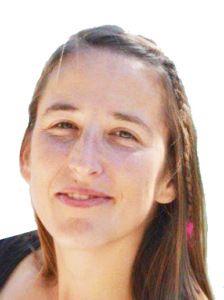Opinion
Green Spotlight: The miracle of slowing down
Sibylle de Valence
This article is more than 5 years old.

Have the courage to raise your head above the parapet and enforce change photo: UN Employment)
Three billion human beings have been forced to slow down. Although this pause is getting very expensive, it is not forbidden to taste its virtues and hope for a better future.
Revelations
Within only a few days of their lockdown, Venetians started sharing photos of clear waterways and fish in the lagoon.
Satellite images have shown striking images of clear skies over some of the world’s smoggiest cities, such as Mumbai or Beijing.
Pollution levels have fallen by 50 percent in New York.
Many Indians can now enjoy views of the Himalayan peaks.
Grass is growing between the ‘Sanpietrini’ cobblestones on the deserted Piazza Navona in Rome.
Lions have been seen taking naps on empty roads usually busy with safari-goers in South Africa.
Has Covid-19 given us a glimpse of what our world could be like if we carry on with some of the behavioral changes beyond the current pandemic? Social science researchers suggest that times of change can lead to the effective introduction of long-lasting habits.
A wake-up call
Although we all agree it’s the worst conceivable way to experience Mother Nature reclaiming its rights, we now know it’s time to smartly prepare our comeback.
The pandemic has shown how fast most people can change their behaviour and adapt if it’s for the health of their families. Some of us have been trying to find an ideological meaning to this epidemic. But while some experts have identified worrying correlations between the coronavirus and heavy-polluted cities, it’s worth remembering that viruses are as old as life on Earth. Since 1945, we’ve had more than our fair share of pandemics, with one in 1957 killing 2 million people, another in 1968 causing 1 million deaths, and a third in 2009 that was responsible for 280,000 deaths.
Socially-responsible entrepreneurs across Europe are summoning their governments to lay out economic stimulus packages related to the deadly virus, which contain measures related to climate and environmental justice. Their main concern is to not repeat the past. They want to seize the opportunity to help our economies recover while becoming more resilient to the next crisis heading our way.
Reclaim your time
Globalisation and climate change might only be symptoms of a deeper ailment: our perpetual exhausting need for speed.
Low-cost flights and Globish (Global English) have resulted in many of us regularly orbiting the globe in an unfulfilled quest for happiness. Over the past decades, we’ve seen our array of possibilities multiply. We wanted it all. The world was ours to explore. And we’ve been caught up in a frenzy to see it all – partly out of a fear we might miss out.
Suddenly, in March 2020, our world paused. Stay home is the new mantra. Take your time. Be idle. Define your own rhythm. Disconnect from 24-hour news and social media that causes anxiety. Reconnect with what really matters: the life around you.
Flexible working
The lockdown has now proved it’s possible and even, in some cases, more efficient to work remotely. In France or Italy, the virus has forced companies to finally embrace the digital era. People have adapted and innovated quickly. Before the outbreak, only 2 percent of employees in Italy were working remotely.
Flexible working is key to curbing pollution in cities choking on unhealthy air. India has the highest number of pollution-linked deaths in the world, with more than 2 million people dying every year.
Reclaiming the streets
“Whenever feasible, consider riding bicycles or walking,” the WHO recommended on April 21.
A growing number of cities around the world are temporarily turning their roads over to walkers and cyclists to make room for social distancing, which can be challenging for pedestrians when the pavements are narrow.
London, Manchester, Brighton, Vancouver, Calgary, Philadelphia, Budapest, Sydney, Berlin, Bogota and Mexico are all implementing people-friendly streets. And bike sales are booming as people look for alternative methods of transportation and exercise.
Parisians are also equipping themselves to return to two wheels so they can avoid public transport, while the city has announced the conversion of 650 km of roads into cycle paths in time for May 11, when the lockdown should be eased in France.
In the same vein, 35 km of city streets will be turned into car-free walkable and cyclable lanes in Milan, where the authorities are keen to stop millions of cars reclaiming the roads as soon as the lockdown is lifted.
After all, air pollution is said to worsen the conditions of those infected.
This all may be happening temporarily for now, but people could get used to it. There might be no going back.

About
Sibylle de Valence
Sibylle is a French journalist, columnist and author who writes for a variety of French, English and Italian language publications, specialising on the green transition. Having lived and worked in San Francisco, Milan, Berlin, Rome, Calgary and Paris, she speaks five languages. Follow her on Instagram at sibdevalence










































